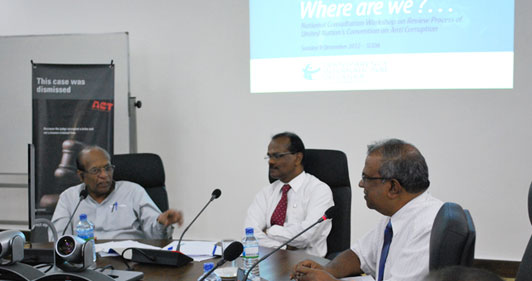“Living in a world of political instability, economic volatility, social insecurity and moral decadence, we witness that the evil of corruptions has become a way of life, so widespread and so deep in the fabric of our society,” stated Hon D E W Gunasekara, Senior Minister of Human Resources addressing a seminar on UNCAC organized by TISL to mark International Anti-Corruption Day – 9 December.
A representative gathering comprising professionals, academics, public officials and civil society representatives participated in the National Consultation Workshop on the review process of the United Nation’s Convention on Anti-Corruption UNCAC). It was organised by TISL to mark International Anti-Corruption on 9 December.
Former Chairman –Ceylon Chamber of Commerce Chandra Jayaratne and Human Rights Activist – Attorney-at-Law J C Weliamuna made presentations. The moderator was TISL Executive Director S Ranugge.
Delivering the keynote address, Minister Gunasekera pointed out that the subject of anti-corruption is topical, urgent and important.
Referring to the Commission Investigating Bribery or Corruption (CIABOC) he said that to say the least, it is competent only in so far as bribery is concerned. “We do not know what it has done in the sphere of corruptions during its long existence. In my view, going after individual cases of corruption will achieve nothing. The evil of corruption is systemic or structural. It is necessary to strike at the root of this evil – the politicization of corruption and criminalization of politics.”
The Minister’s address is reproduced below:
“It is with great pleasure and keenness that I join you in the discussion devoted to the International Anti–Corruption Day.
At the outset, may I offer my sincere thanks to the organizers for their kind gesture, inviting me to deliver the keynote address.
To begin with, corruption is as old as history. It has prevailed under all social, economic and political systems. Founders of all major religions had drawn attention to this evil of corruption. Living in a world of political instability, economic volatility, social insecurity and moral decadence, we witness that the evil of corruptions has become a way of life, so widespread and so deep in the fabric of our society.
As much as the world economy is globalized, today the corruption so widely – spread has become a phenomenon and assumes a globalized dimension. Hence, there was a need to mark an International Anti – Corruption Day.
Looking back deep into the history, there were social barriers or road blocks to corruption – at home, at school, at workplace and society at large. There were parents, relatives, teachers, elders, religious leaders, law – makers, law – enforces, correction – houses like prisons who countered corruption at its at various levels and from womb to tomb. That social safety net for anti – corruption no longer exists. As such, it has now become a global issue as much as global – warming or international terrorism.
So the subject of today’s discussion – anti corruption is topical, urgent and important. To certain it needs a collective effort nationally and globally.

